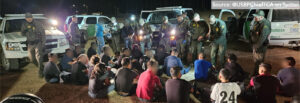“[Tucson Sector Border Patrol Agent Colleen] Agle said smugglers often lie to immigrants, telling them they’ll only walk a couple of hours when they actually walk for days. Even so, the agency discourages water stations for crossers because authorities say it encourages people to risk the journey.”
Please click here to visit the Border Fact Check Blog.
Border Patrol agents in south Texas have welcomed efforts to leave water out for migrants, in order to stem a rapid increase in the number of people dying on U.S. soil from dehydration. “Anytime someone can do something proactively like this it is great, Border Patrol Rio Grande Valley sector spokesman Henry Mendiola told Fox News Latino in January. “These are human lives we’re talking about.”
In Arizona, however, things are very different. Border Patrol agents interviewed by WOLA echoed the arguments in the quotes above. They contend that leaving water for migrants increases incentives for migration, and that much of the water ends up being used by smugglers. Arizona activist groups have resorted to leaving hidden cameras near their water stations, which have captured Border Patrol agents destroying water jugs.
The Facts:
A team from the University of Arizona published an extensive study last week that shows migrants’ need for water is desperate.
To produce In the Shadow of the Wall, Jeremy Slack, Daniel Martínez, Scott Whiteford, and Emily Peiffer led a team that surveyed 1,113 recent deportees in five Mexican border cities, as well as in Mexico City, between 2010 and 2012.
They found that dangerous journeys, with a very real risk of death from dehydration, are exceedingly common in places like southern Arizona and south Texas.
“Three quarters [of those surveyed – 72 percent] relied on a ‘coyote’ or human smuggler to get into the United States, agreeing to pay a median of 2,500 USD for their services. They walked for more than two days through the harsh conditions along the border. Thirty-nine percent ran out of water during their trip and 31 percent ran out of food. The extreme heat and harsh terrain where people cross has killed thousands of people.”
With two out of five migrants running out of water in the desert, the volunteers who leave it for them may be keeping many human beings from avoiding the fate of the 463 migrants whose remains Border Patrol counted on the U.S. side of the border in 2012.
Dehydration and hunger are not the only dangers that the University of Arizona study revealed to be alarmingly common. Of those surveyed:
- 12 percent were robbed by bandits during their last crossing.
- 7 percent were kidnapped (83 out of 1,113; of these, 29 were kidnapped in the United States).
- 6 people witnessed rape.
- 2 people witnessed murders.
- 12 percent witnessed some form of violence against female migrants.
- 17 percent were victims of “cyber kidnappings,” defined as “where people call with false claims about having kidnapped a family member to extort a ransom.”
WOLA’s Border Fact Check debunks false or misleading claims to inform you about what is really happening on the U.S.-Mexico border. To read the latest from our experts, visit www.borderfactcheck.com.

